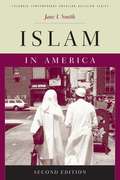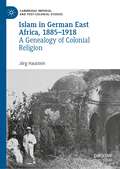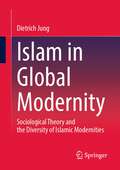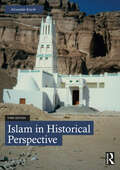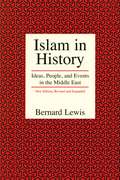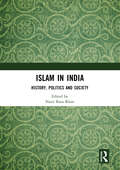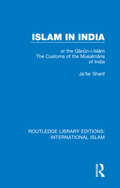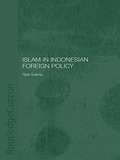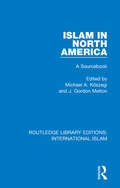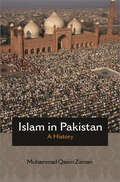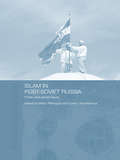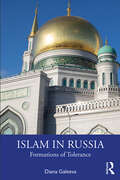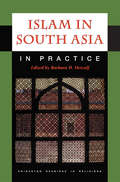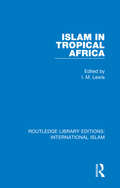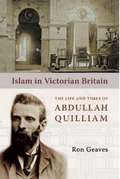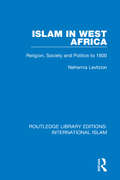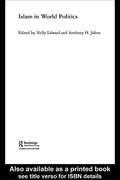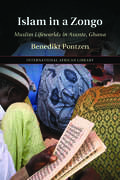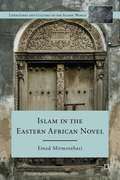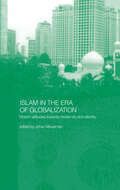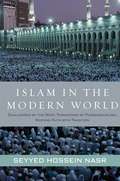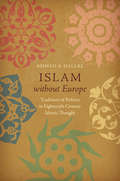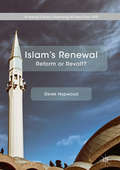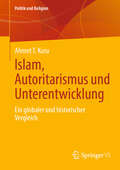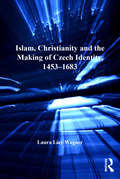- Table View
- List View
Islam in America (Columbia Contemporary American Religion Series)
by Jane SmithThis richly textured, critically acclaimed portrait of American Muslims introduces the basic tenets of the Muslim faith, surveys the history of Islam in North America, and profiles the lifestyles, religious practices, and worldviews of Muslims in the United States. The volume focuses specifically on the difficulty of living faithfully and adhering to tradition while adapting to an American way of life and addresses the role of women in Muslim culture, the raising and education of children, appropriate dress and behavior, and incidences of prejudice and unfair treatment. The second edition of Islam in America features a new chapter on post-9/11 realities, which covers infringements on civil rights and profiling, participation in politics, transformations in Islamic law, pluralism and identity issues, foreign influences, anti-Islamic sentiment, intra-Islamic tensions, and the quest for a moderate Islam. Source notes, glossary, and additional resources also reflect recent developments and scholarship.
Islam in German East Africa, 1885–1918: A Genealogy of Colonial Religion (Cambridge Imperial and Post-Colonial Studies)
by Jörg HausteinIn this rich and multi-layered deconstruction of German colonial engagement with Islam, Jörg Haustein shows how imperial agents in Germany’s largest colony wielded the knowledge category of Islam in a broad set of debates, ranging from race, language, and education to slavery, law, conflict, and war. These representations of ‘Mohammedanism’, often invoked for particular political ends, amounted to a serious misreading of Muslims in East Africa, with significant long-term effects. As the first in-depth account of the politics of Islam in German East Africa, the book makes an essential contribution to the history of religion in Tanzania before British rule. It also offers a template for re-reading the colonial archive in a manner that recovers Muslim agency beyond a European paradigm of religion.
Islam in Global Modernity: Sociological Theory and the Diversity of Islamic Modernities
by Dietrich JungThis book combines sociological theorising with studies on the Middle East and Islam. The diversity of modernities that can be observed in our world is linked to the claim of living in a global modernity, in a world society. The book underpins this claim with numerous excursions into Islamic history. It criticises the view that modernisation can be equated with westernisation and considers different projects of specifically Islamic modernities as integral parts of world society. From this perspective, the study contributes to the "provincialisation" of European history in contemporary social scientific thought. Contrary to the theories of postcolonialism associated with the call for the provincialisation of Europe, however, this book adheres to essential traditions of classical sociology. It thus aims to make a contribution to the social theoretical discussion on modernity, which is empirically underpinned with the help of data from the history of the Middle East and Islam.
Islam in Historical Perspective
by Alexander KnyshIslam in Historical Perspective is a general introduction to Islam and the history of Muslim societies. Richly illustrated by quotations and images from Muslim scripture, historical chronicles, artistic works, and theological and juridical treatises, it invites the reader to examine this evidence and to form a comprehensive understanding of Islam’s evolution from its inception in Arabia to the present day.Combining chronological and thematic principles, this book examines Muslims’ political and intellectual struggles over the meaning and practical implications of their faith. Treating Islam as a language that various factions and generations of Muslims have used to express their grievances, aspirations, and personal experiences and preferences, the book shows the religion’s remarkable potency as a social, political, and cultural force and source of identity. It also describes and analyses Muslim devotional practices, emotional responses to the revelation, artistic and intellectual creativity, and patterns of everyday existence. The goal of this book is to help the reader to develop personal empathy for the subject by showing the relevance of the dilemmas faced by Muslims in different epochs and geographical locations to the burning issues of today’s world. A thorough analysis of pivotal events, trends, and personalities of Islamic history is accompanied by witness accounts showing how they were perceived by Muslims themselves.This new edition features a thoroughly revised text, updated bibliography, new illustrations, study questions and chapter summaries, and is an outstanding resource for students of Islam and Muslim civilization.
Islam in History
by Bernard LewisFrom secular-minded autocrats like Saddam Hussein to religious fundamentalists like Osama bin Laden, powerful voices in the Islamic world have been united by a fierce hatred of the West. If we want to know why they think the way they do, we have to understand the history of Islam and its continuous interactions with the West.This masterly collection of essays by a leading expert on Islam and the Middle East ranges over the whole sweep of Islamic history and Western attempts to comprehend it.
Islam in India: History, Politics and Society
by Nasir Raza KhanIslam in India: History, Politics and Society is based on the historical and contemporary relevance of the religion and its related culture(s) in India. Besides being a major religious doctrine, Islam has been the main political ideology for many dynasties in India such as Delhi Sultanate (1206-1451); the Illbaris Turks (also known as Mamluk 1206–90); Khiljis (1290–1320); Tughlaqs (1320–1414); Sayyids (1414–51), Afghans and the Mughal Empire. Islam played a pivotal role in shaping the polity and society during the period of each dynasty. This book argues that Islam in India ought to be seen not only as a political and religious ideology of the dynasties, but also as a significant force that shaped the cultural fabric of the country. Print edition not for sale in South Asia (India, Sri Lanka, Nepal, Bangladesh, Pakistan and Bhutan)
Islam in India: or the Qᾱnῡn-i-Islᾱm The Customs of the Musalmᾱns of India (Routledge Library Editions: International Islam #5)
by Ja'far SharifFirst published in 1832, this work was at the time considered an authoritative account of the beliefs and practices of the Musalmᾱns of India. This 1921 reprint includes an introduction from the editor, Dr William Crooke, which presents what is known about both Ja’far Sharif and the translator, G. A. Herklots. It also distinguishes the original material from the changes made by the translator and compares the book with other similar works published in the nineteenth-century. This book will be of interest to those studying the history of Islam, the history of ethnography and the British Empire.
Islam in Indonesian Foreign Policy: Domestic Weakness and the Dilemma of Dual Identity (Politics In Asia Ser.)
by Rizal SukmaThis companion volume to the highly successful Islam in Malaysian Foreign Policy explores the extent to which foreign policy in the world's largest Muslim nation has been influenced by Islamic considerations.
Islam in North America: A Sourcebook (Routledge Library Editions: International Islam #2)
by Michael A. Kőszegi and J. Gordon MeltonFirst published in 1992, this book focuses on the Muslim community and how it has developed in North America. Divided into eight sections, it traces the history of the Muslim community in North America from the nineteenth century to the end of the twentieth-century and examines different aspects of the community such as Sectarian Movements, Islam in the African American community and points of contact between Christian and Islamic communities. The text includes a number of bibliographies to aid further study and closes with a helpful directory of Muslim organizations and centers in North America. This book will be of particular interest to those studying Islam and Religion in North America.
Islam in Pakistan: A History (Princeton Studies in Muslim Politics #68)
by Muhammad Qasim ZamanThe first book to explore the modern history of Islam in South AsiaThe first modern state to be founded in the name of Islam, Pakistan was the largest Muslim country in the world at the time of its establishment in 1947. Today it is the second-most populous, after Indonesia. Islam in Pakistan is the first comprehensive book to explore Islam's evolution in this region over the past century and a half, from the British colonial era to the present day. Muhammad Qasim Zaman presents a rich historical account of this major Muslim nation, insights into the rise and gradual decline of Islamic modernist thought in the South Asian region, and an understanding of how Islam has fared in the contemporary world. Much attention has been given to Pakistan's role in sustaining the Afghan struggle against the Soviet occupation in the 1980s, in the growth of the Taliban in the 1990s, and in the War on Terror after 9/11. But as Zaman shows, the nation's significance in matters relating to Islam has much deeper roots. Since the late nineteenth century, South Asia has witnessed important initiatives toward rethinking core Islamic texts and traditions in the interest of their compatibility with the imperatives of modern life. Traditionalist scholars and their institutions, too, have had a prominent presence in the region, as have Islamism and Sufism. Pakistan did not merely inherit these and other aspects of Islam. Rather, it has been and remains a site of intense contestation over Islam's public place, meaning, and interpretation. Examining how facets of Islam have been pivotal in Pakistani history, Islam in Pakistan offers sweeping perspectives on what constitutes an Islamic state.
Islam in Post-Soviet Russia: Public And Private Faces
by Hilary Pilkington Galina YemelianovaThis book, based on extensive original research in the field, analyses the political, social and cultural implications of the rise of Islam in post-Soviet Russia. Examining in particular the situation in Tatarstan and Dagestan, where there are large Muslim populations, the authors chart the long history of Muslim and orthodox Christian co-existence in Russia, discuss recent moves towards greater autonomy and the assertion of ethnic-religious identities which underlie such moves, and consider the actual practice of Islam at the local level, showing the differences between "official" and "unofficial" Islam, how ceremonies and rituals are actually observed (or not), how Islam is transmitted from one generation to the next, the role of Islamic thought, including that of radical sects, and Islamic views of men and women's different roles. Overall, the book demonstrates how far Islam in Russia has been extensively influenced by the Soviet and Russian multi-ethnic context.
Islam in Russia: Formations of Tolerance
by Diana GaleevaIslam in Russia is a rare scholarly attempt to understand the tolerant nature of Islam in the modern Russian Federation since the state’s official acceptance of Islam.The book explores the key factors that have contributed, over time, to the establishment of a co-existent form of Islam in modern multi-ethnic and multinational Russia. It also probes discussion of the role that Russian Muslim intellectuals have played in forming contemporary Russian Islam. It concludes that the co-existent form of Islam in Russia can be linked to three key factors: its historical emergence, the intellectual culture, and strong regional identities.This original and engaging examination of the development and identity of Islam in Russia is a useful resource for students and scholars of Global Islam, Islam in Europe, History of Russia, Islamic History, Islamic Thought and Modern Religious History.
Islam in South Asia in Practice (Princeton Readings in Religions #33)
by Barbara D. MetcalfThis volume of Princeton Readings in Religions brings together the work of more than thirty scholars of Islam and Muslim societies in South Asia to create a rich anthology of primary texts that contributes to a new appreciation of the lived religious and cultural experiences of the world's largest population of Muslims. The thirty-four selections--translated from Arabic, Persian, Urdu, Bengali, Tamil, Gujarati, Hindavi, Dakhani, and other languages--highlight a wide variety of genres, many rarely found in standard accounts of Islamic practice, from oral narratives to elite guidance manuals, from devotional songs to secular judicial decisions arbitrating Islamic law, and from political posters to a discussion among college women affiliated with an "Islamist" organization. Drawn from premodern texts, modern pamphlets, government and organizational archives, new media, and contemporary fieldwork, the selections reflect the rich diversity of Islamic belief and practice in South Asia. Each reading is introduced with a brief contextual note from its scholar-translator, and Barbara Metcalf introduces the whole volume with a substantial historical overview.
Islam in Tropical Africa (Routledge Library Editions: International Islam #4)
by I. M. LewisFirst published in 1980, this second edition of Islam in Tropical Africa presents specialist studies of the history and sociology of Muslim communities in Africa south of the Sahara. The studies cover an extensive and range of time and place, and include consideration of particular aspects of Muslim belief and practice in regions such as Senegal and Somalia. The second edition includes an updated introduction which draws attention to the ways in which differently organized traditional cultures and social systems had reacted and adapted to Muslim influence in the field of politics, law and ritual in the second half of the twentieth century. This book will be of interest to those studying Islam, African studies and ethnography.
Islam in Victorian Britain
by Ron GeavesThis is the first full biography of Abdullah Quilliam (1856-1932), the most significant Muslim personality in nineteenth century Britain. Uniquely ennobled as the Sheikh of Islam of the British Isles by the Ottoman caliph Sultan Abdul Hamid II in 1893, Quilliam created a remarkable Muslim community in Victorian Liverpool, which included a substantial number of converts. Ron Geaves examines Quilliam's teachings and considers his legacy for Muslims today.Ron Geaves is professor of the comparative study of religion at Liverpool Hope University and has contributed substantially to the study of British Islam, religion in South Asia, and fieldwork in religious studies.
Islam in West Africa: Religion, Society and Politics to 1800 (Routledge Library Editions: International Islam #3)
by Nehemia LevtzionFirst published in 1994, this volume brings together essays from the celebrated scholar of African history, Nehemia Levtzion. The articles cover a wide range of themes including Islamization, Islam in politics, Islamic revolutions and the work of the historian in studying this field. This collection is a rich source of supplementary material to Professor Levtzion’s major publications on Islam in West Africa. This book will be of key interest to those studying Islamic and West African history.
Islam in World Politics (Routledgecurzon Advances In Middle East And Islamic Studies)
by Nelly Lahoud Anthony H. JohnsThe essays in this collection examine the emergence of Islam as a force in today’s international political arena. Driven by a concern to understand factors leading to, and the implications of, this heightened political profile the contributors go beyond polemics and apologetics. The book critically examines some of the major events, movements and trends in the Islamic world over the past fifty years and their impact on the international scene. Reflecting the diversity and heterogeneity of the Muslim world, the book covers issues including: the challenge of Islamism to the Muslim world the use of Islam as a political tool on the international scene Islam’s contribution to the theory and practice of global finance Islam’s role in gender discourse Islam’s articulations in the Indian Sub-continent, Southeast Asia, Central Asia and the Arab world. Very little of the current literature deals with political Islam globally, and very few books go much beyond the Middle East and its terrorist groups. This volume fills that gap, providing a compelling cross-national, cross-cultural and interdisciplinary analysis of Islam as a potent political force.
Islam in a Zongo: Muslim Lifeworlds in Asante, Ghana (The International African Library #62)
by Benedikt PontzenZongos, wards in West Africa populated by traders and migrants from the northern savannahs and the Sahel, are a common sight in Ghana's Asante region where the people of these wards represent a dual-minority as both foreigners and Muslims in a largely Christian area, facing marginalisation as a result. Islam provides the people of the zongos with a common ground and shared values, becoming central to their identity and to their shared sense of community. This detailed account of Islamic lifeworlds highlights the irreducible diversity and complexity of 'everyday' lived religion among Muslims in a zongo community. Benedikt Pontzen traces the history of Muslim presence in the region and analyses three Islamic phenomena encountered in its zongos in detail: Islamic prayer practices, the authorisation of Islamic knowledge, and ardently contested divination and healing practices. Drawing on empirical and archival research, oral histories, and academic studies, he demonstrates how Islam is inextricably bound up with the diverse ways in which Muslims live it.
Islam in the Eastern African Novel
by Emad MirmotahariThis study of the sub-Saharan African novel interprets representations of Islam as a central organising presence that generates new conceptual questions and demands new critical frameworks with which to approach categories like nationhood, race, diaspora, immigration, and Africa's multiple colonial pasts.
Islam in the Era of Globalization: Muslim Attitudes towards Modernity and Identity (Routledgecurzon Studies In Asian Religion #No.6)
by Johan MeulemanGlobalization, modernity and identity are fundamental issues in contemporary Islam and Islamic Studies. This collection of essays reflects the wide diversity that characterises contemporary Islamic Studies. The case studies cover regions stretching from China and Southeast Asia to diaspora communities in the Caribbean and Tajikistan. There is significant participation of intellectual voices from all areas concerned, providing a real contribution to the academic exchange between the Muslim and the Euro-American worlds.
Islam in the Modern World: Challenged by the West, Threatened by Fundamentalism, Keeping Faith with Tradition
by Seyyed Hossein NasrAs Muslims grow in numbers, and as Islam's role in world affairs becomes larger, we've begun to see the breakdown of unity among believers. The misunderstandings and friction between Islamic civilization and the modern West continue, but even within Islam, Iran's clerics are split, militant fundamentalists clash with students from Islamic universities, and moderate Muslim-Americans think nothing like Wahhabis from Saudi Arabia. Islam seems to be at war with itself. Extremist factions whose angry rhetoric currently shapes our fears and prejudices have attempted to co-opt the Islamic faith. In Islam in the Modern World, one of the foremost Islamic scholars in the United States takes that faith back, describing and defending traditional Islam against all critics-without and within the faith. This book deals with the hot-button issues of concern to the West: holy wars women's roles in Islam the rise of fundamentalism the future of Shi'ism in Iran Additionally, the author explores lesser-known controversies within Islam, such as the challenge of modern science to religious belief, controversial art and architecture in Islamic cities, the role of the madrassas in education, and urban conditions and challenges in the Islamic world. Islam in the Modern World offers an inside look at this increasingly factious religion with increasing global relevance.
Islam without Europe: Traditions of Reform in Eighteenth-Century Islamic Thought (Islamic Civilization and Muslim Networks)
by Ahmad S. DallalReplete with a cast of giants in Islamic thought and philosophy, Ahmad S. Dallal's pathbreaking intellectual history of the eighteenth-century Muslim world challenges stale views of this period as one of decline, stagnation, and the engendering of a widespread fundamentalism. Far from being moribund, Dallal argues, the eighteenth century--prior to systematic European encounters--was one of the most fertile eras in Islamic thought. Across vast Islamic territories, Dallal charts in rich detail not only how intellectuals rethought and reorganized religious knowledge but also the reception and impact of their ideas. From the banks of the Ganges to the shores of the Atlantic, commoners and elites alike embraced the appeals of Muslim thinkers who, while preserving classical styles of learning, advocated for general participation by Muslims in the definition of Islam. Dallal also uncovers the regional origins of most reform projects, showing how ideologies were forged in particular sociopolitical contexts. Reformists' ventures were in large part successful--up until the beginnings of European colonization of the Muslim world. By the nineteenth century, the encounter with Europe changed Islamic discursive culture in significant ways into one that was largely articulated in reaction to the radical challenges of colonialism.
Islam's Renewal: Reform Or Revolt? (St Antony's)
by Derek HopwoodThe book considers some of the solutions proposed by Muslim activists and thinkers in their attempts to renew (tajdid) their ways of life and thought in accord with the demands of the age in which they lived. The two ways of reacting are studied – the movements led by men of action and inspiration, and the thoughts of quietist scholars who laid greater emphasis on calm continuity. These two streams have often collided and particularly so in the contemporary age of greater violence. Other related problems are also considered: how a non-Muslim should regard the religion of the ‘other’; the ways modernization have been dealt with; and the two root causes of Muslim ‘rage’ today – the invasions of the West and the failure to reach an equitable solution to the problem of Palestine. Building on the author’s sixty-year experience researching the history of Islam, the book will appeal to students and scholars across the fields of Islamic studies, religious history and Middle Eastern politics.
Islam, Autoritarismus und Unterentwicklung: Ein globaler und historischer Vergleich (Politik und Religion)
by Ahmet T. KuruWarum weisen Länder mit muslimischer Bevölkerungsmehrheit im Vergleich zum Weltdurchschnitt ein niedriges Maß an Demokratie und sozioökonomischer Entwicklung auf? Dieses Buch kritisiert Erklärungen, die den Islam als Ursache dieser Ungleichheit anführen, da die Muslime zwischen dem 9. und 12. Jahrhundert philosophisch und sozioökonomisch weiter fortgeschritten waren als die Westeuropäer. Auch der westliche Kolonialismus war nicht die Ursache: Die Muslime litten bereits unter politischen und sozioökonomischen Problemen, als die Kolonisierung begann. Dieses Buch argumentiert, dass die Muslime in ihrer frühen Geschichte, als in Europa religiöse Orthodoxie und Militärherrschaft vorherrschten, einflussreiche Denker und Kaufleute hatten. Im 11. Jahrhundert entstand jedoch ein Bündnis zwischen orthodoxen islamischen Gelehrten (den Ulema) und Militärstaaten. Dieses Bündnis erstickte allmählich die intellektuelle und wirtschaftliche Kreativität, indem es die intellektuellen und bürgerlichen Klassen in der muslimischen Welt marginalisierte. Dieses Bündnis behindert auch heute noch Kreativität und Wettbewerb in muslimischen Ländern. Die Rohfassung der deutschen Übersetzung hat ein maschinelles Übersetzungsprogramm mit Hilfe künstlicher Intelligenz angefertigt. Eine anschließende menschliche Überarbeitung erfolgte vor allem in inhaltlicher Hinsicht, so dass sich das Buch stilistisch anders lesen wird als eine herkömmliche Übersetzung.
Islam, Christianity and the Making of Czech Identity, 1453-1683 (Transculturalisms, 1400-1700)
by Laura Lisy-WagnerUnlike many narratives about the Czech lands, which place them on the periphery of their own history, this study considers Czechs as central characters, looking both east and west to find their place in the early modern world. Islam, Christianity and the Making of Czech Identity, 1453-1683 works through the descriptive and ethnographic texts produced by Czech speakers about Islam and the Ottoman Empire to show how they used this discourse to create Czech identities. Rather than simply constructing identity in opposition to the Islamic Other, Laura Lisy-Wagner shows how these authors played the Holy Roman and Ottoman Empires off each other, creating an autonomous space for themselves in between. Lisy-Wagner introduces sources that are new to English-language historiography and uses them in a way that is new to Czech historiography as well. The chapters are organized based on different categories of agents-travelers, ethnographers, religious leaders, artists, and political revolutionaries-whose voices cast ideas of Europe and Czech identity in the early modern period in a new and different light.
